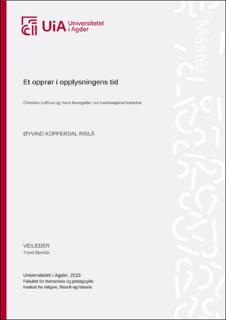| dc.description.abstract | Abstract
This thesis puts the Lofthus uprising (1786-1787) in the Nedenes district of Norway in context with the ideas of the American Revolution and other Enlightenment ideas. The thesis discusses what knowledge Christian Lofthus, his companions and other peasants in the Nedenes district had of these ideas. How did the peasants explain themselves after the uprising? Which kinds of books, newspapers and periodicals did they read? Where did the peasant skippers travel when they sailed abroad?
In their explanations to the commission set up to investigate the events, the peasants sticked to the official royal ideology. They referred to themselves as simple «children» and paid tribute to the king, whom they called a gracious father. Lofthus and his followers denied that they had opposed the king. Their loyalty to the king was probably genuine, but at the same time it was used strategically. At times, the peasants probably tried to undermine the commission’s work by obscuring information or feigning ignorance.
In the second half of the 18th century, more Norwegians became literate, and more printing houses were established in Norway. Over half of the eighteen indicted rebels of the Lofthus uprising can be linked either to a teaching position or to the ownership of books, either by themselves or by family members. Although Bibles and prayer books were the most popular books, peasants in Nedenes also read books about history, law, arithmetic, descriptions of the world, morals and other topics. Several of the indicted rebels, as well as their acquaintances and family members, owned such books. In the thesis, I use the term lesende bønder («reading peasants») to describe the peasants who read more than just religious literature.
The historian Gustav Sætra has suggested that the American Revolution might have inspired Lofthus and other peasants to stand up for their rights. Lofthus himself sailed to Great Britain, while several people he knew had been to America and France. In the thesis, I focus on Denmark-Norway’s colony in the Caribbean, the Danish West Indies (and Christiansted, the largest town in the colony), as a particularly important meeting point between Norwegian skippers and the American world.
British, North American, and French citizens, among others, visited and settled in the Danish West Indies. Most of the ships that docked in Christiansted came from North America. In the Danish West Indies, Norwegian skippers and sailors probably met trade agents and skippers from North America and Great Britain, among others. Several skippers in Lofthus’ circle of acquaintances had sailed to the West Indies during the years before the uprising. One of them, Jens Krøger, even visited Charleston, South Carolina. Although it is difficult to know for certain, it is likely that there was some form of contact between the Norwegian sailors and the foreigners.
In other words, several people in Lofthus’ circle had knowledge of the events in North America, and they knew of some Enlightenment ideas. It is possible that they were influenced by this. Nevertheless, I point to earlier peasant resistance in Nedenes, especially the struggle for the preservation of the «Nedenes privileges», as the most important source of inspiration for Lofthus and his followers. In the thesis, I introduce the term proto-bondepolitikere («proto-peasant politicians») to describe the leadership during the peasant uprisings of the 18th century – often regarded as forerunners of the peasant politicians of the 19th century. | |
